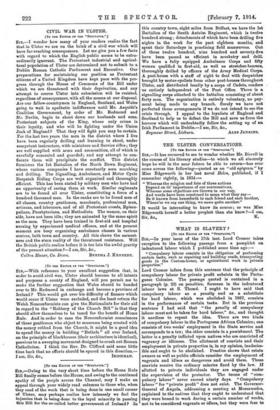CIVIL WAR IN ULSTER.
[To ran Fumes or Tar ••srscraros."J
Sta,—I wonder bow many of your readers realize the fact that in Ulster we are on the brink of a civil war which will have far-reaching consequences. Let me give you a few facts with regard to which the English public seems to be extra- ordinarily ignorant. The Protestant industrial and agricul- tural population of Ulster are determined not to submit to a Dublin Roman Catholic Parliament and Executive. Our preparations for maintaining our position as Protestant citizens of a United Kingdom have kept pace with the pro- gress through the House of Commons of the Bill under which we are threatened with their deprivation, and any attempt to coerce Ulster into submission will be resisted, regardless of consequences, with all the means at our disposal. Are our fellow-countrymen in England, Scotland, and Wales going to wait in apathetic indifference until Mr. Asquith's Coalition Government, by order of Mr. Redmond and Mr. Devlin, begin to shoot down our husbands and sons, Protestant subjects of the King, whose only crime is their loyalty, and who will be fighting under the Union Jack of England? That they will fight you may be certain. For the last two years the men in the district where I live have been regularly drilling and learning to shoot, under competent instructors, with miniature and Service rifles ; they are well supplied with arms and ammunition, all of which is carefully concealed and guarded; and any attempt to con- fiscate them will precipitate the conflict. This district furnishes the 1st Battalion of the North Down Regiment, whose various companies I have constantly seen marching and drilling. The Signalling, Ambulance, and Motor Cycle Despatch Riding Corps are well organized and thoroughly efficient. This has been stated by military men who have had an opportunity of seeing them at work. Similar regiments are to be found all over Ulster, constituting a force of a hundred thousand men. In the ranks are to be found men of all classes, country gentlemen, merchants, professional men, artisans, and labourers, and of all Protestant creeds, Episco- palians, Presbyterians, and Methodists. The women, on their side, have not been idle; they are animated by the same spirit as the men. They have been trained in first-aid and hospital nursing by experienced medical officers, and at the present moment are busy organizing ambulance classes in various centres, both town and country. All this shows the earnest- ness and the stern reality of the threatened resistance. Will the British public realize before it is too late the awful gravity of the present situation P—I am, Sir, &c.,










































 Previous page
Previous page